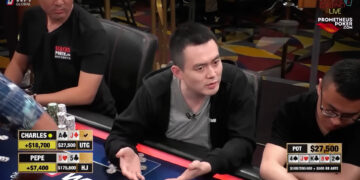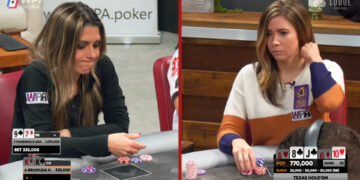Poker can be a ridiculous game. Therefore, it would make sense to write about the best ridiculously simple poker tips for beginners, but are they really going to be ridiculously simple poker tips for beginners? Probably not, but I’m going to try.
My dilemma is that I get too passionate about the game, which then leads to me writing content that goes beyond ridiculously poker tips for beginners. On the other hand, I’m never going to write anything highly technical and boring. And I might have a decent track record at engaging the reader. For instance, I already told you that I probably won’t be able to keep this to ridiculously simple poker tips for beginners yet you’re still here. I’m happy about this. I hope you are as well.
You will be even happier to know that I’m going to keep these poker tips for beginners simple by making it a ten-point list. It’s not a top-ten list. That would mean there was an order of importance. This is just an order. With that out of the way let’s get to the poker tips for beginners.
The Best Poker Tips for Beginners
#1. Fold After A Hit

Do you know how I can tell if someone is a professional poker player or not? If something bad happens to that player, I watch what they do following that event. If they play more poker hands than usual following that event, they’re chasing. This means they’re emotional. It also means they’re not a professional poker player.
Getting emotional goes against our poker rules for winning. After a bad event, a professional poker player will fold more poker hands than usual. That player knows that they need to avoid emotional decisions and regroup before getting involved again.
It’s extremely rare to lose a big pot and then get involved in the next hand and win a big pot. That being the case, I highly recommend staying out of the way after you lose a big pot. I would only play AA, KK, QQ, AK, and the big blind if you get a free look at the flop because nobody has raised. Fold all other hands in order to take emotion out of the picture. This will be profitable over the long haul.
There is a well-kept secret about Texas Hold’em poker tournaments that only some people know. Mental Strength > Traditional Poker Strategy. If someone told me that I could bet on one of two poker players over the course of ten Texas Hold’em poker tournaments, I would take the player with the mental strength over the one with the traditional poker strategy. Every day of the week! Focus in anything in like is incredibly powerful.
Have you ever been overwhelmed or intimidated by something in your life, but you told yourself that you were going to do it anyway and then did it? If so, then you know what I’m talking about. On the other end of the spectrum, has there ever been something you knew you were capable of accomplishing but just couldn’t get yourself motivated enough to accomplish that feat? See … it works both ways.
Think about it. You had more aptitude in the second example, but you overachieved in the first example because you were more focused. The secret to winning in poker tournaments for beginners is to play very few poker hands, stay out of the way, win the pots when you’re ahead, and only bluff small when you’re heads-up against someone who has you pegged as a Nit.
You can actually use this approach in all poker games and you will come out a long-term winner. It really is that simple. You don’t need to read about all the complicated poker strategy for all poker games. That’s for high stakes. We’re not starting there. We want to crush the small stakes, which fits into our poker rules for winning.
#2. Stick With Low Buy-Ins

I just received a text this morning from my biggest fan. The dude listens to The Perfect Range every single day! My SPATS strategy is so ingrained in his mind that he now knows and understands it better than me. His text told me that he has been at the Flamingo for a week and has played in nine small buy-in poker tournaments.
He has cashed in six of those tournaments and won five of them. He is obliterating his competition. Prior to reading The Perfect Range, he was a terrible poker player. Since reading The Perfect Range, he has cashed in more poker tournaments than anyone else where he plays in South Carolina.
This doesn’t mean you need to read The Perfect Range. It would certainly help, but what I’m trying to say is that if you’re a beginner and you stick with me, I will help you. For this point on poker tips for beginners, stick with small buy-ins. The fees will be higher, but think of it as paying for training, and those lower buy-ins have much softer fields.
#3. Anyone Can Win With a Big Hand
Anyone can win a monster pot with a big hand. Not everyone will extract as much value as possible, but it’s pretty darn hard to lose when you have the nuts, and anyone can be dealt the nuts. This player did nothing to earn this. The difference between the winning player and the losing player in all poker games is how much someone can cut costs on losing hands.
This goes pretty deep, but since this is an article about poker tips for beginners, I’ll do my best to keep it simple. Let’s begin with pre-flop. You’re dealt KT-off in middle position and someone from UTG has raised three times the big blind. Do you call, fold, or raise?
If you answered fold, you are correct. If someone is raising from Under the Gun, they are very likely to have KT-off beat because they’re raising from the weakest position. When someone is in the weakest position, they should only be raising with a top-four hand.
Let’s say you’re on the button with KT-off and nobody raised yet. You can call here to see a flop. That’s fine. Now let’s say the flop is QT3. One player bets and another player min-raises. Now it’s on you. What do you do with middle pair here? You fold!
Some poker players will think: Well, I only have middle pair, but I could hit trips or two pair if I hang around. This is a bad decision. This player will very rarely make trips (and it could still be a loser). And does this player really want to make two pair with a king peeling off? That could give one of his opponents a straight.
There is a time where you do want to call with middle pair in that spot. It’s when you’re heads-up against a strong or loose player. You know this player sees an opportunity to steamroll you, but don’t get nervous. Just call the flop. If this player was bluffing and they see you call, they will usually check the turn. That’s your opportunity to bet and win the hand. If your opponent bets again on the turn, fold. Even if it was a bluff, who cares? It was a small pot anyway.
See … stay calm and you will be good to go. Your opponents are not geniuses. Stop giving them too much credit. Just play your game and you will be just fine. They might know more than you, but you have more mental strength than them. At least you will now.
#4. Play In Soft Poker Games
This one is pretty easy. If you’re going to play cash games, go for the lowest stakes in the room. If you’re a beginner, I would first walk around the room to see the chip stacks at the 1/2 NL games. I would then ask to be seated at the table with the fewest chips. Yes, the fewest chips!
If you see a table with low chips stacks, it means they’re playing with scared money. You will sometimes find 1/2 games with a few big stacks. Those players are controlling the table. Stay away from that. You will find a table with low chip stacks much easier. The approach here is live training, not to make a lot of money. You can make a lot of money in the future.
This, by the way, is one of the most important poker tips for beginners. Don’t overlook it.
#5. Eliminate Ego
There will come a time in your poker career where you tell yourself that you’re sick of someone pushing you around. You’re then going to overplay your cards and get into trouble. I hope this doesn’t happen to you, but it seems to be part of a poker player’s journey. All I can say in an attempt to prevent this is that it’s much better to let the game come to you and to accept what the game gives you. Never force the action. It’s not you vs. another player. It’s you vs. yourself.
#6. Robotic, Emotionless, & Tight Is Right
You’re not at this place yet, but I want you to know something. You will sometimes play poker and all your movements and decisions will feel automatic. You’re winning but not getting emotional about it. You see the game extremely well because it’s moving so slowly in your mind. Nothing can stop you.
But it’s not a steamroller-like invincibility. It’s more of calm invincibility. If you take a hit, no big deal, you will get it back when the time is right. You don’t go on tilt. Don’t even know what that means. You are in the zone!
When this happens, it’s an incredible feeling. If you’re at a cash game, stay there until you lose 10% of your peak profit. That’s when it’s time to go. And don’t worry about not leaving at your peak. That’s impossible to do every time. It’s about where you finish vs. where you started, not where you finish vs. your peak.
#7. How to Play Against Monster Hands
There are going to be times when you know that your opponent has AA, KK, QQ, or AK. Let’s forget AK for right now and assume your opponent has AA, KK, or QQ. You know this because it’s a tight player who raised bigger than usual. This is a player that raises based on the strength of their hand (bad idea).
This is going to seem like one of the craziest poker tips for beginners, but if you can get in relatively cheap and you’re holding a pair, a suited-connector, or a suited one-gapper, call! Yes … call. This relates to implied odds.
If you hit a set, straight, or flush, you’re probably going to get that player’s entire stack. People have trouble folding AA, KK, and QQ. There aren’t many opportunities to stack an opponent in this game. This is the best opportunity. However, DO NOT call with any combination of Broadway cards if you have your opponent on AA, KK, or QQ. That can lead to you getting stacked because you might hit top pair and have trouble finding the fold button.
#8. This Is Not Your Job
Don’t make poker your job. If you do that, you’re going to feel a ton of pressure to win. I’ve been there. It’s tough! Some people think that I’m just a professional poker player, but I do a lot more than that. I write books, I write articles, and I sometimes get paid to go to poker rooms. And we’re working on a movie, but we’re still one year out from completion.
My point is that you need to have another source of income in order to feel at ease at the poker table. I fought tooth and nail to make sure my side income related to poker because I’m so passionate about the poker world. You can do the same, but it takes a while. Do whatever you want. Just make sure poker isn’t your only income. Downswings will mess you up.
#9. Isolate
At the low-stakes poker games, it’s easy to isolate by raising 4x-5x the big blind pre-flop. From there, place a continuation bet on the flop. You’re going to win a lot more than you’re going to lose. You want to do this when you’re in late position and nobody has raised yet. You’re the open-raiser. It’s also most effective when you DON’T have an ace.
This way, you have two chances to win: You can either hit your hand (something like JT-suited) or represent an ace that hits the flop. If you find a soft table in low stakes, this works very well. You will dominate.
#10. Read Pre-Flop Betting Patterns
This is one of the best poker tips for beginners. It seems to never fail. I have no idea how people haven’t picked up on what they’re doing. This is even effective on the Circuit, which is crazy.
If someone raises 2.5x the BB, they don’t have a strong hand. It’s a good hand, not a monster. You can either raise them off the hand pre-flop or know that they have Broadway cards and play it accordingly the whole way to the river.
If someone min-raises pre-flop, they’re trying to build a pot with suited cards in case they hit.
If someone raises 3x the BB, they likely have AK-off, AQ-suited, AJ-suited, KQ-suited, JJ, or TT.
If they raise 4x the BB or more, they likely have AA, KK, QQ, or AK-suited, and sometimes JJ because they’re afraid to play it, but that only applies to soft players.
The game is a lot more fun when you know your opponents’ hole cards.
Final Thoughts
I strongly advise reading these poker tips for beginners over and over again. I would also recommend studying #10 with those pre-flop raises. My only concern is that I’m giving away too much information, and this is not a joke, but I’ll roll with it. See you at the WSOP!
♠ pokerjournal.org
Poker Tips for Beginners – FAQ
What poker game should I play if I'm a beginner?
1/2 NL Texas Hold'em.
How do you become a poker player?
You make a mental decision that you're going to find a way to win and go hit the tables in a live poker room.
How much does it cost to buy-in to a 1/2 NL poker game?
The buy-in range for 1/2 NL differs from one poker room to the next. The most common buy-in ranges are $60-$300 and $100-$300.
Can you raise your own bet in poker?
No. You cannot raise your own bet in poker.


















Discussion about this post